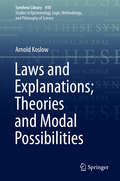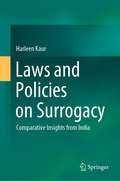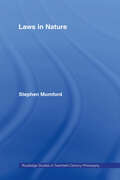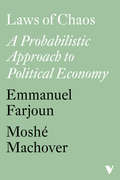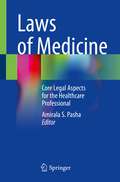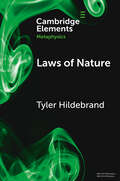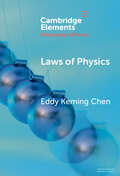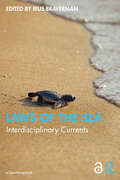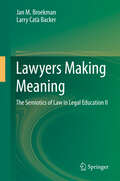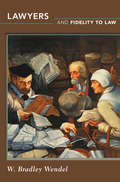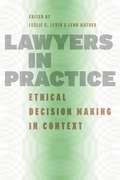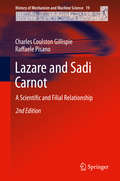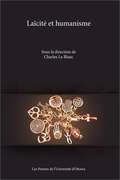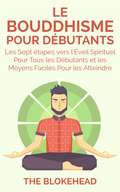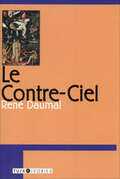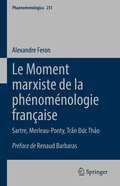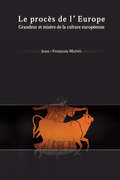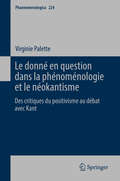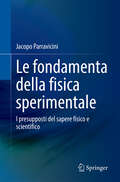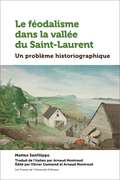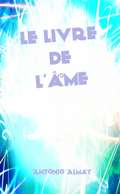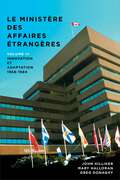- Table View
- List View
Laws and Explanations; Theories and Modal Possibilities (Synthese Library #410)
by Arnold KoslowThe book has two parts: In the first, after a review of some seminal classical accounts of laws and explanations, a new account is proposed for distinguishing between laws and accidental generalizations (LAG). Among the new consequences of this proposal it is proved that any explanation of a contingent generalization shows that the generalization is not accidental. The second part involves physical theories, their modality, and their explanatory power. In particular, it is shown that (1) Each theory has a theoretical implication structure associated with it, such that there are new physical modal operators on these structures and also special modal entities that are in these structures. A special subset of the physical modals, the nomic modals are associated with the laws of theories. (2) The familiar idea that theories always explain laws by deduction of them has to be seriously modified in light of the fact that there are a host of physical theories (including for example, Newtonian Classical mechanics, Hamiltonian, and Lagrangian theory, and probability theory) that we believe are schematic (they do not have any truth value). Nevertheless, we think that there is a kind of non-deductive explanation and generality that they achieve by subsumtion under a schema.
Laws and Policies on Surrogacy: Comparative Insights from India
by Harleen KaurThis book is an essential guide on surrogacy, discussing various legal issues that arise in surrogacy cases. It provides a comprehensive coverage to various issues pertaining to surrogacy arrangements due to failure to meet the needs of those involved in surrogacy, be it the intended parents or the surrogate mother, with special emphasis on the most vulnerable party -- the surrogate child. In the wake of this existing imbalance, the call to reform the practice of surrogacy has also increased. The book provides a comprehensive coverage to various laws and policy regulations in existence dealing with surrogacy, and unravels the latest trends and developments happening around the world as surrogacy gains importance. The international perspectives highlight policies and practices being adopted and followed by various nations with regard to surrogacy regulation and associated parenthood rules. This book also analyses some of the significant cross-border disputes revolving around surrogacy, and explores briefly the jurisprudence of the European Court of Human Rights on matters of parentage and citizenship for children born of trans-national surrogacy with special reference to the prospects of a convention on international surrogacy currently being studied by The Hague Conference on Private International Law. Further, it highlights the issues and questions relating to surrogacy arrangements that are so far unresolved and unanswered and suggests measures for improvements to the existing proposed surrogacy legislation in India and need for uniform international regulation. The book is a great resource for legal practitioners, academics, students, policy-makers, infertility clinics, and charitable organizations working on this issue.
Laws in Nature (Routledge Studies in Twentieth-Century Philosophy #Vol. 18)
by Stephen MumfordMumford outlines a major new theory of natural laws. His book begins with the question of whether there are any genuinely law-like phenomena in nature. The discussion addresses questions currently being debated by metaphysicians such as whether the laws of nature are necessary or contingent and whether a property can be identified independently of its causal role.
Laws of Chaos: A Probabilistic Approach To Political Economy
by Moshé Machover Emmanuel FarjounClassic work of political economicsA defining work of Econophysics, and republished for the first time since 1983, Laws of Chaos is an attempt to construct a non-deterministic theoretical framework for the foundations of political economy. It relies on probabilistic and statistical methods of the kind used in the modern foundations of several other sciences, introducing scientific modelling into economics for the first time.
Laws of Medicine: Core Legal Aspects for the Healthcare Professional
by Amirala S. PashaThis book provides an overview of the US laws that affect clinical practice for healthcare professionals with no legal background.Divided into thirteen sections, each chapter starts with a summary of the chapter’s content and relevant legal concepts in bullet points before discussing the topics in detail. An application section is provided in many chapters to clarify essential issues by reflecting on clinically relevant case law or clinical vignette(s). Filling a crucial gap in the literature, this comprehensive guide gives healthcare professionals an understanding or a starting point to legal aspects of healthcare.
Laws of Nature (Elements in Metaphysics)
by Tyler HildebrandThis Element provides an opinionated introduction to the metaphysics of laws of nature. The first section distinguishes between scientific and philosophical questions about laws and describes some criteria for a philosophical account of laws. Subsequent sections explore the leading philosophical theories in detail, reviewing the most influential arguments in the literature. The final few sections assess the state of the field and suggest avenues for future research.
Laws of Physics (Elements in the Philosophy of Physics)
by Eddy Keming ChenDespite its apparent complexity, our world seems to be governed by simple laws of physics. This volume provides a philosophical introduction to such laws. I explain how they are connected to some of the central issues in philosophy, such as ontology, possibility, explanation, induction, counterfactuals, time, determinism, and fundamentality. I suggest that laws are fundamental facts that govern the world by constraining its physical possibilities. I examine three hallmarks of laws-simplicity, exactness, and objectivity-and discuss whether and how they may be associated with laws of physics.
Laws of the Sea: Interdisciplinary Currents
by Irus BravermanLaws of the Sea assembles scholars from law, geography, anthropology, and environmental humanities to consider the possibilities of a critical ocean approach in legal studies. Unlike the United Nations’ monumental Convention on the Law of the Sea, which imagines one comprehensive constitutional framework for governing the ocean, Laws of the Sea approaches oceanic law in plural and dynamic ways. Critically engaging contemporary concerns about the fate of the ocean, the collection’s twelve chapters range from hydrothermal vents through the continental shelf and marine genetic resources to coastal communities in France, Sweden, Florida, and Indonesia. Documenting the longstanding binary of land and sea, the chapters pose a fundamental challenge to European law’s “terracentrism” and its pervasive influence on juridical modes of knowing and making the world. Together, the chapters ask: is contemporary Eurocentric law—and international law in particular—capable of moving away from its capitalist and colonial legacies, established through myriad oceanic abstractions and classifications, toward more amphibious legalities? Laws of the Sea will appeal to legal scholars, geographers, anthropologists, cultural and political theorists, as well as scholars in the environmental humanities, political ecology, ocean studies, and animal studies.
Lawyers Making Meaning....
by Jan M. Broekman Larry Catà BackerThis book present a structure for understanding and exploring the semiotic character of law and law systems. Cultivating a deep understanding for the ways in which lawyers make meaning--the way in which they help make the world and are made, in turn by the world they create --can provide a basis for consciously engaging in the work of the law and in the production of meaning. The book first introduces the reader to the idea of semiotics in general and legal semiotics in particular, as well as to the major actors and shapers of the field, and to the heart of the matter: signs. The second part studies the development of the strains of thinking that together now define semiotics, with attention being paid to the pragmatics, psychology and language of legal semiotics. A third part examines the link between legal theory and semiotics, the practice of law, the critical legal studies movement in the USA, the semiotics of politics and structuralism. The last part of the book ties the different strands of legal semiotics together, and closely looks at semiotics in the lawyer's toolkit--such as: text, name and meaning.
Lawyers and Fidelity to Law
by W. Bradley WendelEven lawyers who obey the law often seem to act unethically--interfering with the discovery of truth, subverting justice, and inflicting harm on innocent people. Standard arguments within legal ethics attempt to show why it is permissible to do something as a lawyer that it would be wrong to do as an ordinary person. But in the view of most critics these arguments fail to turn wrongs into rights. Even many lawyers think legal ethics is flawed because it does not accurately describe the considerable moral value of their work. In Lawyers and Fidelity to Law, Bradley Wendel introduces a new conception of legal ethics that addresses the concerns of lawyers and their critics alike. Wendel proposes an ethics grounded on the political value of law as a collective achievement that settles intractable conflicts, allowing people who disagree profoundly to live together in a peaceful, stable society. Lawyers must be loyal and competent client representatives, Wendel argues, but these obligations must always be exercised within the law that constitutes their own roles and confers rights and duties upon their clients. Lawyers act unethically when they treat the law as an inconvenient obstacle to be worked around and when they twist and distort it to help their clients do what they are not legally entitled to do. Lawyers and Fidelity to Law challenges lawyers and their critics to reconsider the nature and value of ethical representation.
Lawyers in Practice: Ethical Decision Making in Context
by Levin Leslie C. Lynn MatherHow do lawyers resolve ethical dilemmas in the everyday context of their practice? What are the issues that commonly arise, and how do lawyers determine the best ways to resolve them? Until recently, efforts to answer these questions have focused primarily on rules and legal doctrine rather than the real-life situations lawyers face in legal practice. The first book to present empirical research on ethical decision making in a variety of practice contexts, including corporate litigation, securities, immigration, and divorce law, Lawyers in Practice fills a substantial gap in the existing literature. Following an introduction emphasizing the increasing importance of understanding context in the legal profession, contributions focus on ethical dilemmas ranging from relatively narrow ethical issues to broader problems of professionalism, including the prosecutor’s obligation to disclose evidence, the management of conflicts of interest, and loyalty to clients and the court. Each chapter details the resolution of a dilemma from the practitioner’s point of view that is, in turn, set within a particular community of practice. Timely and practical, this book should be required reading for law students as well as students and scholars of law and society.
Layers In Husserl's Phenomonology
by Peter R. CostelloLayers in Husserl's Phenomenology provides close readings and analyses of a number of Husserl's key translated and untranslated works across the entirety of his corpus. While maintaining a dialogue with four decades' worth of scholarship on Husserl, Peter R. Costello provides a number of new and significant insights that depart from earlier interpretations of his work, along with a revised, consistent translation of a number of important Husserlian terms.Layers in Husserl's Phenomenology situates Husserl firmly within the trajectory of later Continental thought and contributes to the recent reconsideration of Husserl as a legitimate precursor to the thought of Maurice Merleau-Ponty, Emmanuel Levinas, and Jacques Derrida. Written in a readable style appropriate for both undergraduate and graduate students, this study will be valued by those interested in phenomenology in general and in Husserl in particular.
Lazare and Sadi Carnot
by Raffaele Pisano Charles C. GillispieLazare Carnot was the unique example in the history of science of someone who inadvertently owed the scientific recognition he eventually achieved to earlier political prominence. He and his son Sadi produced work that derived from their training as engineering and went largely unnoticed by physicists for a generation or more, even though their respective work introduced concepts that proved fundamental when taken up later by other hands. There was, moreover, a filial as well as substantive relation between the work of father and son. Sadi applied to the functioning of heat engines the analysis that his father had developed in his study of the operation of ordinary machines. Specifically, Sadi's idea of a reversible process originated in the use his father made of geometric motions in the analysis of machines in general. This unique book shows how the two Carnots influenced each other in their work in the fields of mechanics and thermodynamics, and how future generations of scientists have further benefited from their work.
Lazare and Sadi Carnot
by Charles Coulston Gillispie Raffaele PisanoLazare Carnot was the unique example in the history of science of someone who inadvertently owed the scientific recognition he eventually achieved to earlier political prominence. He and his son Sadi produced work that derived from their training as engineering and went largely unnoticed by physicists for a generation or more, even though their respective work introduced concepts that proved fundamental when taken up later by other hands. There was, moreover, a filial as well as substantive relation between the work of father and son. Sadi applied to the functioning of heat engines the analysis that his father had developed in his study of the operation of ordinary machines. Specifically, Sadi's idea of a reversible process originated in the use his father made of geometric motions in the analysis of machines in general. This unique book shows how the two Carnots influenced each other in their work in the fields of mechanics and thermodynamics and how future generations of scientists have further benefited from their work.
Laïcité et humanisme (Philosophica)
by Charles Le BlancLaïcité et humanisme : un titre et deux mots de grande actualité tant au Québec qu’ailleurs dans le monde. Cet ouvrage, avec des contributions d’acteurs clés qui alimentent le débat sur le sens et la définition de la laïcité dans le Québec du xxie siècle, arrive à point nommé.Les textes de Thomas De Koninck, Jacques Dufresne, Georges Leroux, Guillaume Rousseau, Mathieu Bock-Côté, Normand Baillargeon, Mohamed Lotfi et Charles Le Blanc ne défendent pas une thèse particulière à propos de la laïcité. Ils forment plutôt un ensemble de réflexions polyphoniques qui se présentent comme une contribution philosophique, juridique, politique et sociologique à la question de la neutralité religieuse de l’État.À la fin du recueil figure un texte de Voltaire sur la tolérance, qui vient à la fois inscrire les questions abordées dans une perspective historique et illustrer le caractère continu d’un débat dont cet ouvrage se veut l’un des nombreux échos. Publié en français
Le Bouddhisme Pour Debutants
by The BlokeheadLe Bouddhisme facile - Votre Vie est sur le point de devenir meilleure... Vous sentez-vous stressé(e)? Etes-vous dépassé(e) par les demandes et tâches du quotidien et souhaitez-vous être plus en paix et atteindre un état de pleine conscience? La solution pour vous est : Le Bouddhisme Pour Débutants - Les Sept Etapes vers l'Eveil Spirituel pour les Débutants et les Moyens Faciles pour les Atteindre Cet ouvrage est un outil utile pour atteindre l'éveil spirituel et constitue une source d'information à propos du Bouddhisme comme style de vie et pour vous accompagner sur le chemin de l'éveil. Petit aperçu du Bouddhisme Pour Débutants : ✔ Comprendre les Quatre Vérités Nobles ✔ Comprendre le Chemin Noble (Et les Autres Chemins vers l'Eveil Spirituel) ✔ L'Acceptation ✔ Le Lâcher-prise (Non-Identification) ✔ Et bien plus encore...
Le Contre-ciel (Tusk Ivories)
by Rene DaumalThe author of Mount Analogue explores an uncharted path to the authentic self in this enlightening volume of poetic meditations. For Rene Daumal, true living can only be experienced after the facade of self-identity has been stripped away through a kind of metaphysical suicide. As he states in the second poem of this collection, &“The individual mind attains its absolute through successive negations. I am that which thinks, not that which is thought.&” In Le Contre-Ciel, Daumal invites his readers to venture with him on this Existential journey. Through philosophically contemplative poems, he acts as both chronicler and guide to the process of regeneration-through-negation in pursuit of genuine self-knowledge.
Le Livre Des Pensées
by Antonio AlmasLe Livre des Pensées d'Antonio Almas est Un livre avec de petites réflexions sur la vie, la spiritualité et la société. Se perdre, ce n'est pas ne pas savoir revenir, mais ne pas savoir avancer.
Le Moment marxiste de la phénoménologie française: Sartre, Merleau-Ponty, Trần Đức Thảo (Phaenomenologica #231)
by Alexandre FeronEntre la fin de la Seconde Guerre mondiale et le début des années 1960, certaines des figures majeures du courant phénoménologique en France, Jean-Paul Sartre, Maurice Merleau-Ponty et Trần Đức Thảo, considèrent que le projet d’articuler marxisme et phénoménologie constitue l’un des principaux enjeux de la philosophie dans le monde contemporain. L'objet de cet ouvrage est de comprendre la spécificité du travail philosophique effectué par chacun de ces penseurs sur ces deux courants de pensée apparemment incompatibles afin de rendre possible leur synthèse. L'auteur retrace la manière dont le projet initial de 1944 a été progressivement mis en question et reconfiguré au contact des mutations politiques et historiques, des débats philosophiques et du développement des sciences humaines. Ce volume, qui s’adresse aux étudiants et chercheurs, met ainsi en lumière les enjeux et les innovations conceptuelles de ce qui reste l'un des moments les plus féconds et originaux de la philosophie française contemporaine.This text covers the period between the end of the Second World War and the beginning of the 1960s, when the phenomenological school in France was represented by Jean-Paul Sartre, Maurice Merleau-Ponty and Tran Duc Thao, who endeavored to combine Marxism with phenomenology as the major task of philosophy in the modern world. The object of this text is to understand the specificity of the philosophical work each performed on these two apparently incompatible schools of thought, in order to make their synthesis possible. The author traces the way in which the initial project of 1944 was progressively questioned and reworked in the wake of political and historical change, philosophical debates and the development of human sciences. This volume appeals to students and researchers while bringing to light the underlying stakes and conceptual innovations of what remains one of the most fertile and original moments in contemporary French philosophy.
Le Procès de l'Europe: Grandeur et misère de la culture européenne (Philosophica)
by Jean-François MattéiL’Europe se trouve aujourd’hui en position d’accusée, souvent par les Européens eux-mêmes, du fait de sa prétention à l’universalité, de sa supériorité proclamée et de son arrogance intellectuelle. Qu’elle n’ait pas toujours été fidèle à ses principes, lors de la colonisation des autres peuples, ne met pourtant pas en cause sa légitimité. La critique de l’Europe n’est en effet possible qu’à l’aide des normes juridiques et des principes éthiques qu’elle a diffusés auprès de tous les peuples pour connaître le monde plutôt que pour le juger.Levinas n’avait donc pas tort de louer «la générosité même de la pensée occidentale qui, apercevant l’homme abstrait dans les hommes, a proclamé la valeur absolue de la personne et a englobé dans le respect qu’elle lui porte jusqu’aux cultures où ces personnes se tiennent et où elles s’expriment.» Il faut en prendre son parti : il n’y a pas plus d’égalité des cultures que de relativisme des valeurs. On ne saurait faire le procès de l’universel sans faire appel à la culture qui a donné cet universel en partage aux autres cultures.
Le donné en question dans la phénoménologie et le néokantisme
by Virginie PaletteCet ouvrage explore les critiques du donné dans le néokantisme et la phénoménologie allemands. Il révèle la portée considérable de ces critiques, qui impliquent en même temps une controverse avec le positivisme de la fin du XIXème siècle et un dialogue substantiel avec l’Esthétique transcendantale de Kant. En posant les questions de la sensation et de la perception, la présente monographie permet de ménager un accès privilégié aux enjeux fondamentaux de la philosophie austro-allemande au tournant du XXème siècle. Lorsqu’il est question du donné ou des critiques du donné dans le discours philosophique contemporain, et cela arrive souvent dans les débats sur la perception en philosophie de l’esprit, c’est toujours à la controverse analytique autour du « mythe du donné » que l’on fait référence – controverse, qui a vu le jour en 1956, lorsque le philosophe américain Wilfrid Sellars publie Empirisme et philosophie de l’esprit. Or, il est intéressant d’observer que la critique sellarsienne du « mythe du donné » a été préfigurée, en un sens partiel mais important, par les objections que les néokantiens et les phénoménologues ont adressées à la notion de donné au tournant du XXesiècle. La présente monographie comble cette lacune béante de l’historiographie classique, qui a jusqu’ici accordé peu d’attention à la constance de cette critique dans toutes les philosophies marquées par l’héritage de Kant.
Le fondamenta della fisica sperimentale: I presupposti del sapere fisico e scientifico
by Jacopo ParraviciniQuesto libro ha lo scopo di fornire un’ampia riflessione sui principi generali della fisica e gli elementi fondanti della conoscenza scientifica nella loro unitarietà. Sfruttando largamente il pensiero di molti tra i più grandi scienziati, esso offre una chiara comprensione dei fondamenti della fisica e del suo metodo sperimentale, ponendo in risalto le correlazioni tra i principali eterogenei elementi che vi stanno alla base. Si ricorda come le scienze sperimentali non siano statiche ma, al contrario, soggette a continui studi e ripensamenti. Nell'affrontare la mancanza di lezioni o trattazioni sistematiche sulla natura del metodo scientifico nei tradizionali corsi universitari tecnico-scientifici, l'autore si addentra così nello studio di ciò che sta alla base della scienza in generale, e della fisica in particolare. Sono trattati temi quali la relazione tra fenomeni naturali e il linguaggio matematico, mettendo in risalto i principali snodi dello sviluppo concettuale nella scienza. Inoltre l’autore discute l’importanza della “pratica scientifica” sottolineandone il ruolo nell’avanzamento della conoscenza scientifica, e il modo con cui essa contribuisce alla fisica nel suo complesso. Il libro è suddiviso in tre parti, ciascuna delle quali copre differenti aspetti della fisica e dei suoi fondamenti: la prima parte riguarda le radici fenomenologiche e gli strumenti basilari della disciplina; la seconda si concentra sulla struttura della conoscenza scientifica; la terza tratta i metodi pratici dell’indagine scientifica. Il libro rimane accessibile per qualsiasi studente di discipline tecnico-scientifiche, poiché un non fisico sarà agevolmente in grado di trovare facilmente in libri di testo di natura introduttiva spiegazioni di quei concetti fondamentali dati per assodati.
Le féodalisme dans la vallée du Saint-Laurent: Un problème historiographique (Amérique française)
by Matteo SanfilippoL’histoire de la seigneurie laurentienne est-elle la fille du conflit politique ? C’est, entre autres, à cette question que répond Le féodalisme dans la vallée du Saint-Laurent : un problème historiographique. Dans cet ouvrage, Matteo Sanfilippo résume et analyse 250 années (1763-2008) de production historiographique au Canada français et au Canada anglais portant sur le régime seigneurial laurentien.Sanfilippo remet dans leur contexte historique les discours et les débats sur ce régime, qui sont inextricablement liés aux dynamiques politiques canadiennes.Le féodalisme dans la vallée du Saint-Laurent est un essai unique dans le paysage historiographique canadien. Il est ici traduit en français pour la première fois. À l’heure d’un renouveau certain de l’histoire seigneuriale laurentienne, lectrices et lecteurs pourront découvrir les enjeux complexes de son écriture en faisant la rencontre de la pensée originale de Matteo Sanfilippo.Enfin, les historiens Olivier Guimond et Arnaud Montreuil signent une postface dans laquelle ils poursuivent les réflexions de Matteo Sanfilippo entre 2008 et aujourd’hui.
Le livre de l'âme
by Antonio Almas Florence Barnichon LuronLa poésie n’est pas seulement une histoire de phonétique, où les mots ont du rythme, et les phrases une structure stricte. La poésie c’est surtout le sens, où chaque phrase est comme un acteur jouant un rôle, pour un public avide de sensations. Le secret de cette mise en scène est de stimuler l’imagination du lecteur, de façon à lui permettre d’élaborer chaque scénario présent dans ses rêves. La poésie est véritablement la faculté de créer de nouveaux univers.
Le ministère des Affaires extérieures du Canada, Volume III: Innovation et adaptation, 1968−1984 (Politique et politiques publiques)
by Greg Donaghy John Hilliker Mary HalloranEn 1968, le ministère des Affaires extérieures du Canada est en état de siège. Terminées les décennies de croissance et de succès diplomatiques de l’après-guerre. La technologie et la libéralisation des échanges annoncent une ère de mondialisation. Devant les chocs pétroliers et l’inflation galopante, l’économie est en désarroi. La mondialisation s’invite au programme des affaires internationales en y ajoutant de nouveaux dossiers : droits de la personne, notamment ceux des femmes, énergie, science et technologie, environnement, révolutions et terrorisme à l’échelle mondiale. Le nouveau premier ministre, Pierre Trudeau, adhère à cette mutation. Ébranlé, le ministère peine d’abord à résister aux fortes pressions intérieures, politiques et économiques. Pendant les années 1970, toutefois, il parvient peu à peu à retrouver sa pertinence. Il se concentre sur une diplomatie d’ordre économique et invente des mécanismes administratifs qui lui permettent de concilier une perspective naturellement ouverte sur le monde avec les préoccupations particulières du gouvernement sur le front intérieur. Chemin faisant, les Affaires extérieures contribueront à la formulation de politiques innovantes au regard des principaux enjeux de l’époque, notamment les missions de maintien de la paix des Nations Unies, la décolonisation, le dialogue Nord-Sud, le Moyen-Orient, la crise des otages en Iran et les dangers incessants de la Guerre froide.Publié en français
